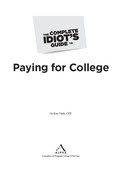Buying Yourself Some Time
Student loans come with a number of built-in deferral mechanisms that allow a graduate or someone taking a break from college to get her feet on the ground before she has to start repaying her debts. The initial deferments all students are entitled to last six months for Stafford and PLUS loans and nine months for Perkins loans. However, if you are or expect to be strapped for cash, additional deferments or forbearances can be applied for.

DEFINITION
Although the terms often seem to overlap, a deferment is a temporary suspension of loan payments being due, usually under an established program with standard criteria. A forbearance can include a temporary reduction in payments, a total waiver of payments, or a suspension of payments similar to a deferment. The big difference between the two is that a forbearance is typically granted according to the lender’s internal standards and policies, as opposed to deferment standards set by the Department of Education.
Deferments and forbearances can be especially helpful if you are experiencing extenuating circumstances that are somewhat beyond your control and would benefit from delaying repayment past the standard 6 or 9 months.
Deferments
Deferments past what is initially granted for each type of loan might be requested for a number of reasons. If they are granted, loan interest will continue to be piled on top of your balance, with the exception of subsidized loans, which might have the interest accrual temporarily halted.
To qualify for a deferment, you must typically fall into one of the following deferment categories:
• In-school deferment—This type of deferment is available to students who re-enroll in school on at least a half-time basis. This type of deferment is valid for as long as a student remains in school.
• Military deferment—Students and graduates directly serving as active-duty personnel in a war, peace-keeping activity, or national emergency can defer their loans as long as they continue to serve, up to a 3-year maximum.
• Economic hardship deferment—If the household income for your family size is less than 150 percent of the national poverty guideline, you can request deferment every 12 months, for up to 3 years.
• Parental leave deferment—Students who become pregnant and need to take a leave from their studies can request a deferment of up to 6 months, as long as they are not working or attending school.
• Working mother deferment—If a borrower is not earning $1 per hour more than the federal minimum wage and has a child who is in kindergarten or younger, she can request a deferment of up to 12 months.
• Public service deferment—Students who are serving in the Armed Forces during peace time, in the Public Health Service, in the Peace Corps, in the National Oceanic and Atmospheric Administration, in the Action programs, or as a paid volunteer in certain tax-exempt organizations can request a deferment up to 3 years during their service.
• Unemployment deferment—Borrowers who are unemployed (subject to certain verification requirements) can defer for up to 36 months.
• Disability deferment—A borrower suffering from a temporary total disability (subject to a doctor’s verification) can request deferment every 6 months for up to 3 years.

CHEAT SHEET
If you have any other debt you’re struggling to pay, such as a car loan, a mortgage, or credit cards, consider taking a deferment on your student loans and redirecting that cash toward eliminating that higher interest debt. This is especially true of subsidized debt, where deferral also stops the accumulation of interest on your student loans.
Forbearances
Earning a forbearance is less predictable than a deferment. That’s because deferments are granted according to strict government standards, while forbearances are granted according to a lender’s own internal policies. What that means is that you should never count on a forbearance as a way to temporarily avoid making payments, because there’s no guarantee you’ll be granted one. If possible, you’ll always want to use a deferment first. But, if you need a forbearance or you’ve exhausted your deferral options, you shouldn’t hesitate to ask your lender for help.
Generally, a forbearance is granted when the lender thinks a temporary break in payments will actually raise the probability of paying off your loan later. So if you’re going to ask for a temporary reprieve, you need to do it right. This means that you need to communicate hope in your situation changing, explaining that you should have no problem resuming payments once you get that new job, pay off another debt, or experience some other change in your circumstances.
..................Content has been hidden....................
You can't read the all page of ebook, please click here login for view all page.
